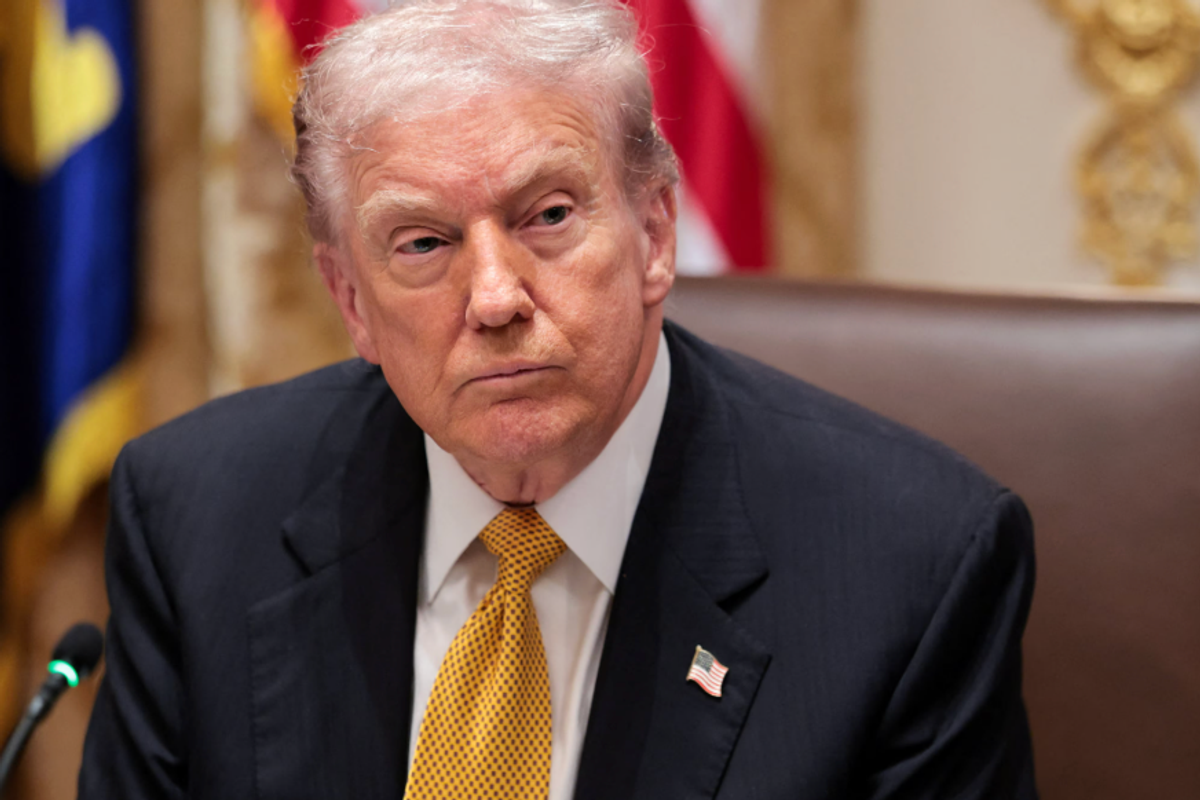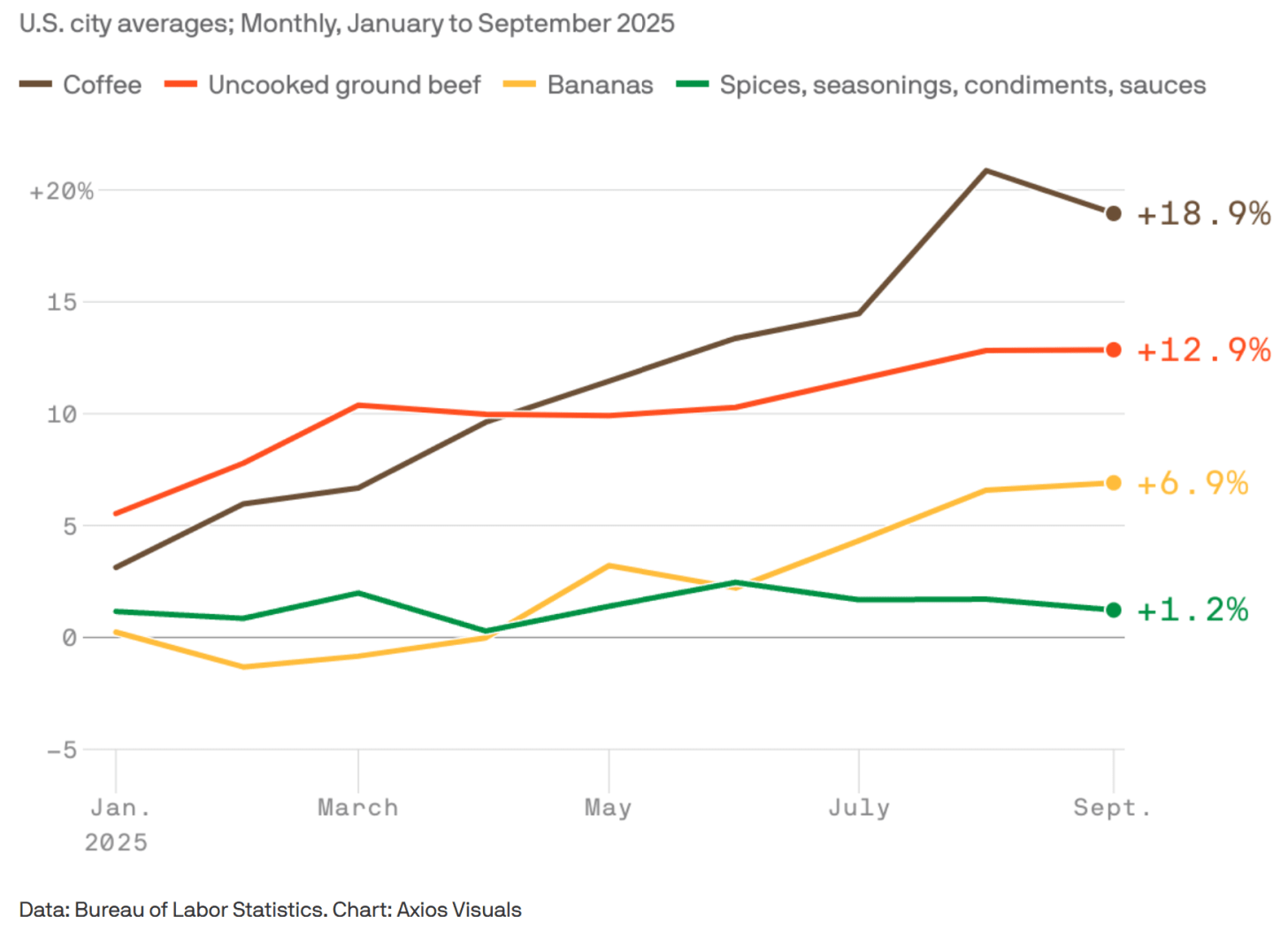After The Blue Wave, Affordability Trumps Tariffs At The MAGA White House

President Donald Trump listening to reporter's question about inflation on November 15, 2025
Among the many fallouts from the mini-blue-wave election earlier this month was Trump and the White House finally picking up on the affordability challenges that are besetting so many American families.
True, Trump labeled the issue a “Democratic con,” claimed costs were already way down, and said he didn’t want to hear about it. And yet, the White House just announced that their “reciprocal” tariffs will no longer apply to a set of groceries including coffee (price up 19% percent over the past year), ground beef (up 13 percent), avocados, tropical fruit (oranges, mangoes, bananas, pineapples), and more.

What are the economics and politics in play here?
On the economics, even tariff supporters had a hard time supporting tariffs on goods and sectors that we were never going to develop in America, like coffee and bananas. And Trump never tried to hide his motivation for his 50% Brazilian tariffs: to support fellow authoritarian Jair Bolsonaro. But Brazil is a big exporter of both beef and coffee, so those tariffs have been removed.
Will formerly tariffed grocery prices quickly fall? From the AP:
The Food Industry Association, which represents retailers, producers and a variety of related industry firms and services, applauded Trump’s move to provide “swift tariff relief,” noting that import U.S. taxes “are an important factor” in a “complex mix” of supply chain issues.
Um…"swift relief” for whom? As noted, these tariffs boosted consumer prices, but a) they are not the only factor in play (e.g., beef prices have been impacted by drought), and b) consumer passthrough has not been dollar-for-dollar. Analysts, myself included, have pointed out that tariffs have been partially absorbed by thinner profit margins, so ending the tariffs could show up as higher margins.
But it’s reasonable to assume that the consumer passthrough that has occurred will unwind and these prices will come down some, though be aware of the rockets/feathers story: a positive price shock will quickly lead to a price spike (rockets) while a negative shock will take hold more gradually.
On the politics, will this help the White House? Probably, to some degree. These are staples, consumed regularly. But they’ve got two big problems.
First, this move is just so contrary to their rhetoric about tariffs not having any impact on prices. Everyone already knew this was nonsense, but now that they’re admitting it, what about everything else up and down the retail aisles?
Here’s Rep. Don Beyer (D-VA) in that same AP article:
“President Trump is finally admitting what we always knew: his tariffs are raising prices for the American people. After getting drubbed in recent elections because of voters’ fury that Trump has broken his promises to fix inflation, the White House is trying to cast this tariff retreat as a ‘pivot to affordability.”
It is also not incidental that any price relief offered through tariff reduction only gets us back to where we were, pre-April ‘25. I seriously doubt that an effective affordability policy is “First, we made things more expensive. Now, we’re going back to what they used to cost. You’re welcome, America!”
Second, the affordability challenge has many dimensions, of which groceries are but one. There’s health care, which Trump and Rs made much worse by taking away tax credits, thereby doubling coverage costs for tens of millions of Americans, a fact the the Ds effectively elevated during the shutdown. There’s child care, energy costs, housing, and more.
I recently argued that the foundational problem facing Trump (who’s approval rating just hit new lows) and the Rs is that they have none of the policy-muscle-memory necessary to craft responses to the affordability crisis. They’ve just shown that they can, when pushed by a electoral whupping, reverse some—just some—of the damage they’ve done. But that just underscores my point.
It’s up to the Ds and the rest of us to a) roll up our sleeves and craft that agenda, b) make sure everyone knows who, when it comes to affordability, is fighting for whom.
Jared Bernstein is a former chair of the White House Council of Economic Advisers under President Joe Biden. He is a senior fellow at the Council on Budget and Policy Priorities. Please consider subscribing to his Substack.
Reprinted with permission from Econjared.
- When Will Trump Focus On Inflation? Aides Say Just Wait Till New Year ›
- Trump Won Vowing To 'Get Prices Down Fast' -- But Now 'It's Very Hard' ›
- 'The Ideas Are There': Shutdown End Signals Renewed GOP Assault On Health Care ›
- GOP Insiders Fear Trump Economy Is 'Ticking Timebomb' For Midterm ›
- The Issue That Won Trump Another Term Is Now His Worst Nightmare ›
- When Scott Bessent Claims Trump Is Making Life Affordable, Who Believes Him? ›
- Inherited Conditions: Biden Left Trump The Best Economy In Half A Century - National Memo ›
- Fox News Spinning Madly To Make Sense Of Trump's 'Affordability' Message - National Memo ›
- A Decent Slice: The Affordability Crisis Isn't Only About Prices - National Memo ›
- Danziger Draws - National Memo ›
- 'No No No No!" Treasury Secretary Roasted For Denying Inflation Under Trump - National Memo ›
- How Trump Is Schooling Americans On The Economics Of Punitive Tariffs - National Memo ›
- Beyond Trump's Latest Crazy Pardon, Glimpses Of A Post-Trump America - National Memo ›
- Danziger Draws - National Memo ›
- Sorry Mr. President, But The Affordability Crisis Isn't A 'Hoax' - National Memo ›
- Virginia's First Female Governor Inaugurates Her 'Affordability Agenda' - National Memo ›
- Why Donald Trump Is Finally Waving A White Flag In Minnesota - National Memo ›







